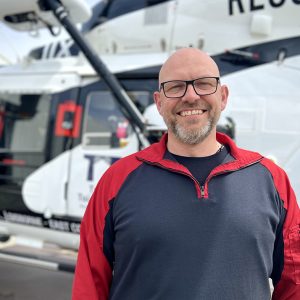Colin Green may have spent much of his career instructing others in the practice of paramedicine but, for his new job, he was ready to get schooled.
Having signed up as critical care flight paramedic for the Trust Tairāwhiti Eastland Rescue Helicopter, Colin had to train in flying to add to his medical skills.
And, he says, he’s loving it.
By the time he did his first Gisborne shift in early October he’d already spent a month doing clinical work at (ops company) Search and Rescue Services’ base in Hamilton, and aviation training at their site in Taupo.
“It’s been an incredible learning curve doing everything from diagnostic work to winch training,” Colin says.
“Working in aviation medicine is something I’d been interested in for years so it’s fantastic to be doing it here in Gisborne.”
It has been 25 years since the Kent-raised Englishman began his career as an ambulance tech with the UK ambulance service, quickly progressing as a paramedic, advance care paramedic, and into major incident management roles.
“I’d actually planned to go into the police force but just didn’t feel it was the right fit so I found that in paramedicine,” he says.
“There’s a certain type of personality that needs to be busy, that needs to be challenged, and I guess I am one of those.”
As his career progressed Colin worked with a Kiwi paramedic who raved about his home country.
So after nearly seven years working with Britain’s NHS, he and wife Emma came to New Zealand for a visit and, deciding it was for them, made the big move.
Colin was first posted to Hato Hone St John’s Tamaki site, in South Auckland, at the time the country’s busiest station.
“That totally suited me but there were still fewer jobs than we were doing in the United Kingdom, so it was a great opportunity to explore a new city,” he says.
“The station covered Otara, Otahuhu and Mangere where there is a big population of Maori and Pacific Islanders. It was an amazing space for experiencing and learning about cultures and people I would never have come across if I’d stayed in the UK.”
In 2011 the couple and their new daughter relocated to the Waihi station from which Colin worked runs on the Coromandel Peninsula, where he became acting territory manager.
A couple of years later the trio took a six-month hiatus to return to the United Kingdom to spend time with family.
But Colin still worked, this time for a European repatriation service for British people who had been hurt or become unwell overseas and needed to get home.
During that six months he travelled by road or air to 15 different countries which, he says, piqued his interest in aviation medicine.
But when the family headed back Down Under, in 2015, he remained land-bound, returning to Waihi where he was soon sharing his experience with others as clinical support officer overseeing clinical education in the region.
And after relocating to Rotorua in 2021 he continued that work both in his role with St John’s clinical development team, and as an advisor with Te Kaunihera Manapou, the Paramedic Council of New Zealand.
That’s a role he will keep up while also commuting to Gisborne for the four-day blocks that make up his roster with the Eastland Rescue Helicopter team.
It’s the best of both worlds, says Colin, allowing him to give back to his industry while enjoying the pace of heli-medicine.
“Getting up-to-speed has been a fascinating challenge with the new skills, procedures and expanded diagnostic capabilities used in the rescue helicopter environment,” he says.
“Once you are outside of a major metropolitan area this is the absolute fastest way to deliver critical care to a patient and I was really keen to be a part of that.
“And of course I’m loving the flying . . . it’s been a blast.”
CAPTION: THE NEED FOR SPEED: “Once you are outside of a major metropolitan area (a rescue helicopter) is the absolute fastest way to deliver critical care to a patient,” says Trust Tairāwhiti Eastland Rescue Helicopter critical care flight paramedic Colin Green.
